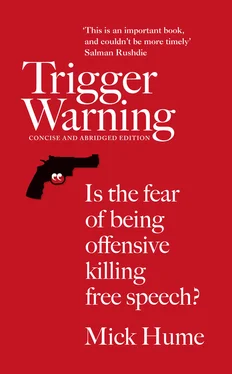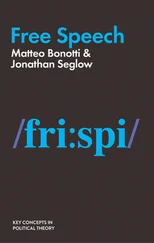But the threats to free speech are always changing. The UK parliament has not yet voted to make anybody drink poisoned hemlock, like Socrates, for saying the wrong thing.
This short book is intended to highlight the new challenges to our most precious liberty in the twenty-first century. It aims to provide some ammunition for fighting the new free-speech wars.
In our Anglo-American culture today free speech is not threatened by jackbooted state censorship. The more insidious threat comes from a creeping crusade for conformism in thought and speech. The slogan emblazoned on the crusaders’ banner is ‘You Can’t Say That!’.
It has become the fashion not only to declare yourself offended by what somebody else says, but also to use the ‘offence card’ to demand that they be prevented from – and possibly punished for – saying it.
The most dramatic attack on ‘offensive’ freedom of speech in modern times was the Charlie Hebdo massacre in 2015. Islamist gunmen murdered eight cartoonists and journalists and four others at the Paris offices of the satirical magazine, supposedly to ‘avenge the prophet’ after Charlie published cartoons mocking Muhammad.
The massive ‘Je Suis Charlie’ demonstrations that followed the massacre and the connected murders at a Jewish supermarket were uplifting displays of human solidarity that made an impression on us all. They also, however, gave a misleading impression of the state of play with free speech in Europe and America.
Here, it might have appeared, was a clear cultural divide: on one side, a free world united in support of freedom of expression; on the other, a handful of extremists opposed to liberty. Behind those solidarity banners, however, Western opinion was far less solidly for free speech.
Many public figures could hardly wait to stop paying lip service to liberty and start adding the inevitable qualifications, obfuscations and, above all, ‘buts’ to their supposed support for free speech. To quote the American writer Andrew Klavan, it looked like ‘The Attack of the But-Heads’. 1
It quickly became clear that the threat to freedom came not just from a few barbarians at the gate. Free speech faces more powerful enemies within the supposed citadel of civilisation itself. Those ‘Je Suis Charlie’ placards had hardly been cleared from the streets before another international consensus emerged, stretching from the Pope to the Chinese Communist Party and encompassing much of Western liberalism between. All agreed that the Charlie Hebdo massacre showed the need to restrict ‘hate speech’, ban inflammatory words and images and curtail the right to offend.
Thus after the mass killings committed by Islamist gunmen came the mass free-speech fraud committed by Western elites – making ritualistic gestures of support for free speech ‘in principle’ while hammering it in practice.
That free-speech fraud did not come out of the blue. If there really was such solid support for free speech, it would not have taken the cold-blooded murder of cartoonists to prompt our politicians and public figures to mention it. The sudden loud expressions of support for free speech were so striking because they contrasted with the everyday reality that we in the West now spend far more time discussing how to restrict free speech than how to defend and extend it.
The hard fact is that the Islamic gunmen who attacked Charlie Hebdo acted not just as the soldiers of an old Eastern religion. They also acted as the armed extremist wing of a thoroughly modern Western culture of enforced conformism, fighting for a highly fashionable belief in your right to suppress whatever you find offensive. The Islamist gunmen simply took that attitude to a murderous extreme.
It was the culmination of a steady loss of faith in freedom of speech and the ability of people to handle uncomfortable words or images. Since the Charlie Hebdo massacre it has become obvious that those who would kill free speech are winning the battle. The motto of our age is not ‘Je Suis Charlie’ but ‘Vous Ne Pouvez Pas Dire Ca!’, which roughly translates as ‘You Can’t Say That!’.
Free speech in Anglo-American society is under siege from three main enemies in the modern age.
First, there are the official censors in government and the courts who want to control offensive and inflammatory speech. In the UK and Europe they are using hate-speech laws to convict thousands every year of speech crimes. Even in the US, where freedom of speech is legally protected by the First Amendment to the constitution, the principle has fallen so far out of favour among the political elite that the New York Times feels free to ask whether it is ‘time to reconsider that constitutional line’.2
Second, there are the increasingly influential unofficial censors, the witch-hunting Twitter mobs and online petitioners pursuing and trying to silence everybody whose views are not to their taste. Often foremost among them have been the student officials and activists seeking to ‘No Platform’ anybody, feminist or funnyman, who might make a student feel ‘uncomfortable’.
The third enemy of free speech today is self-censorship. Under pressure from the first two, and unsure of which opinions are now acceptable or even which words they are permitted to use, many people now fight shy of expressing any strong views that might fall outside the mainstream. Those whose words stray from the straight and increasingly narrow are often quick to withdraw and apologise for any potential offence caused at the first sign of a wagging finger.
This new alliance against free speech is not only active in the traditional political sphere. It is invading areas which might once have been thought of as off-limits for censorship.
The internet ought to be the best thing to happen to freedom of expression since the invention of the printing press. Now free speech online is under attack from Twitter mobs and social media lobbies demanding that something be done to stop them being offended by words. Whatever the pretext, the net effect is always to reduce the scope for unfettered free speech online, and waste the extraordinary opportunities offered by the internet for advancing freedom and open discussion.
For example, nobody seems certain how to define a troll, yet everybody apparently agrees that something must be done about them. This fashion for troll-hunting provides an all-purpose, all-seasons licence to police what is said on the internet. In the UK and Europe the law has joined in the international troll-hunt, and people have been charged and imprisoned for online thought crimes. Even in the US, troll-hunting has become a national blood sport, with Twitter – previously advertised as ‘the free speech wing of the free speech party’ – setting up an Orwellian-sounding Trust and Safety Council to police the tweets.
To claim that you have been ‘trolled’ has become a sign of virtue through victimhood. To be outraged by trolls offers those attacked confirmation that they are in the right – and an excuse to attack the right to free speech online. Nobody has to read, listen to or take seriously what some twit tweeting from his mum’s back bedroom has to say. We should be free to ignore them or respond in kind. But nobody should have the right to use the label ‘troll!’ as a gag to silence those opinions they don’t like online.
Universities should be citadels of open-minded inquiry and freedom of speech. Yet, remarkably, the university campus has become a major new front in the war on free speech, on both sides of the Atlantic. What’s remarkable is not that academic freedoms are under assault – they have been threatened by outside forces since the first European universities were established in the Middle Ages. What beggars belief is that it is now students and academics themselves who are joining campus authorities in trying to impose new limits on free speech and free thinking in UK and US universities. Far from being ivory-towered bastions of freedom, our universities have come to see themselves more as a womb-like fortress to protect young people from dangerous words and ideas.
Читать дальше












